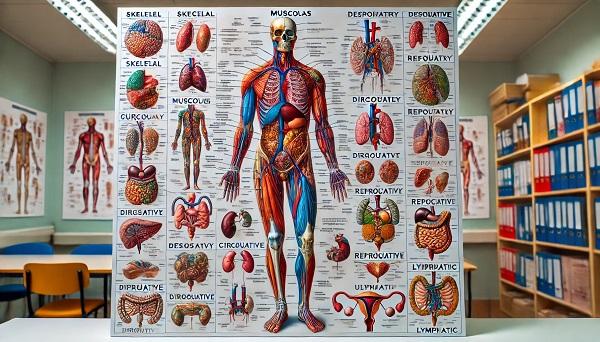
Understanding human anatomy is crucial for medical students, educators, and health professionals. Anatomy charts are excellent tools for visual learners, providing clear and detailed illustrations of various body systems. Below, we explore some essential anatomy charts that can enhance your learning experience.
Skeletal System Anatomy Charts
The skeletal system forms the foundation of human anatomy. A detailed skeletal system chart can help students and professionals identify bones, understand their structure, and learn about their functions. A good skeletal system chart should be easy to read, anatomically accurate, and durable for long-term use.
- Recommended Chart: Skeletal System Anatomical Chart
- Features: Laminated for durability, life-size images, detailed labeling.

Muscular System Anatomy Charts
The muscular system is complex, with numerous muscles working together to facilitate movement and stability. A comprehensive muscular system chart is invaluable for understanding muscle groups, their locations, and their functions. Such charts are particularly useful for physical therapists, personal trainers, and students in kinesiology programs.
- Recommended Chart: Muscular System Anatomical Chart
- Features: Clear illustrations, detailed muscle group labeling, laminated for durability.
Nervous System Anatomy Charts
The nervous system controls and coordinates body activities by transmitting signals to and from different parts of the body. Anatomy charts focusing on the nervous system are essential for understanding the brain, spinal cord, and peripheral nerves. These charts are beneficial for neurology students, medical professionals, and anyone interested in how the body communicates internally.
- Recommended Chart: Nervous System Anatomical Chart
- Features: Detailed illustrations, highlights key structures, color-coded for easy learning.
Circulatory System Anatomy Charts
The circulatory system, comprising the heart and blood vessels, is critical for transporting nutrients and oxygen throughout the body. Charts detailing the circulatory system can help students and professionals understand the heart’s anatomy, blood flow pathways, and the function of different blood vessels.
- Recommended Chart: Circulatory System Anatomical Chart
- Features: Anatomically accurate, includes major arteries and veins, laminated for protection.
Digestive System Anatomy Charts
Understanding the digestive system is essential for students of medicine and nutrition. Anatomy charts that focus on the digestive system help in identifying organs involved in digestion, understanding their functions, and visualizing the process of nutrient absorption.
- Recommended Chart: Digestive System Anatomical Chart
- Features: Detailed organ illustrations, includes major digestive pathways, laminated surface.
Respiratory System Anatomy Charts
The respiratory system is vital for breathing and oxygenating the blood. Anatomy charts of the respiratory system provide a clear view of the lungs, airways, and the mechanics of breathing. These charts are helpful for medical students, respiratory therapists, and anyone studying pulmonary health.
- Recommended Chart: Respiratory System Anatomical Chart
- Features: Clear, detailed illustrations, highlights key respiratory structures, durable lamination.
Urinary System Anatomy Charts
The urinary system plays a crucial role in waste removal and maintaining body fluid balance. Anatomy charts detailing the urinary system help in understanding the kidneys, bladder, and the urinary tract. These charts are particularly useful for students in nephrology and urology.
- Recommended Chart: Urinary System Anatomical Chart
- Features: Detailed organ structures, highlights urinary pathways, laminated for long-term use.
Reproductive System Anatomy Charts
Reproductive system charts provide detailed views of the male and female reproductive organs. These charts are essential for medical students, educators, and professionals in gynecology and urology. They help in understanding the structure, function, and relationship between different reproductive organs.
- Recommended Chart: Reproductive System Anatomical Chart
- Features: Gender-specific illustrations, detailed labeling, laminated for durability.
Lymphatic System Anatomy Charts
The lymphatic system is part of the immune system and plays a vital role in protecting the body against infections. Anatomy charts that focus on the lymphatic system help in visualizing lymph nodes, vessels, and the flow of lymph fluid. These charts are beneficial for students and professionals in immunology and oncology.
- Recommended Chart: Lymphatic System Anatomical Chart
- Features: Detailed lymphatic pathways, clear illustrations, laminated surface.
Conclusion
Anatomy charts are indispensable tools for enhancing understanding of human body systems. Whether you are a student, educator, or healthcare professional, these charts provide valuable visual aids that support learning and teaching. Invest in high-quality, durable anatomy charts to enrich your knowledge and professional practice.




